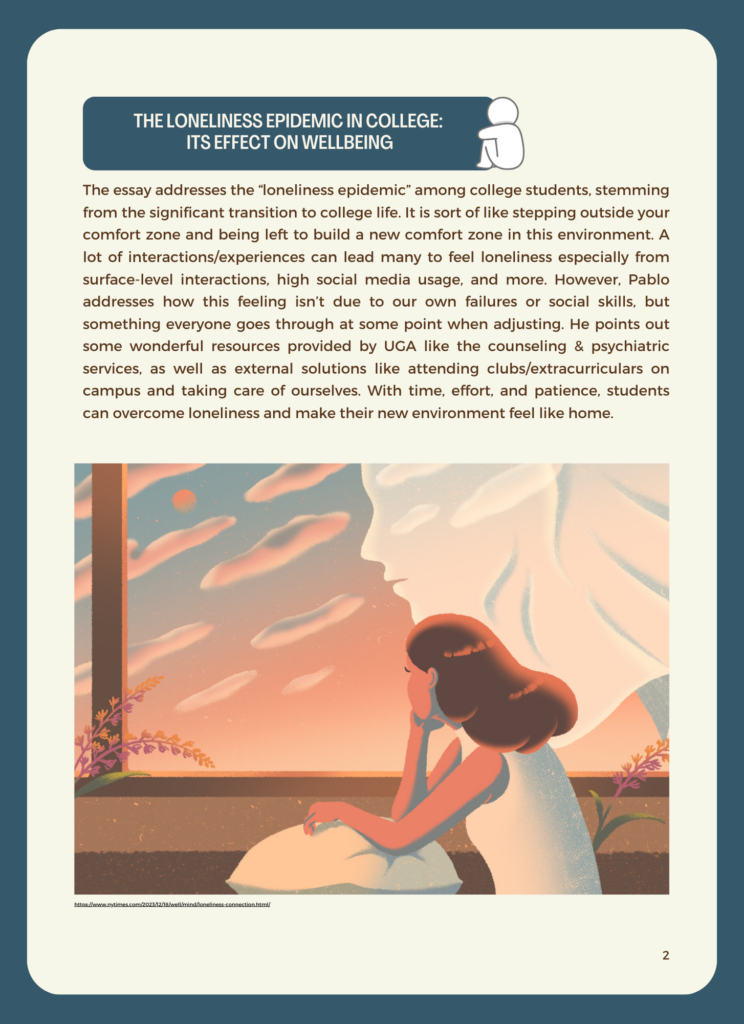The Loneliness Epidemic in College: Its Effect on Wellbeing


PABLO ASHI –
My almost three-month trial run at UGA has proved to have its ups and downs. Some ups: the power bowls at Snelling, my chem class (shoutout Dr. A), sunbathing on Myers Quad, and “Calling the Dawgs” at my first college football game. Some downs: losing my water bottle (twice), missing the bus multiple times and above all, a strange feeling of loneliness. It’s intermittent, coming and going like waves into the shore; despite meeting new people and attending fun events, I can’t fight the feeling that I’m sometimes, somehow, isolated from those around me.
On a campus bustling with almost 40,000 students, the last thing you (and I) might expect is to feel lonely, but it’s a common feeling shared by most. In a survey conducted by the nonprofit organization ActiveMinds involving 1,100 U.S. university students, nearly two-thirds (64.7%) report they feel lonely, the majority (51.7%) are concerned about their friends’ mental health, and three in 10 (28.8%) report severe psychological distress. Chronic loneliness has been shown to exacerbate negative feelings of hopelessness, depression, and even suicide. Moreover, it is associated with poor health behaviors including disrupted sleep, increased screen time, and the use of illegal substances.
Transitioning to college life is a major shift. We’re leaving the familiar: our support systems, daily routines, and hometown surroundings. Our first 18 years of life were spent finding a niche in our communities, and college is a restart for many. Not only do we have to adjust to the academic rigor of top public institutions, but also balance new social experiences and connections. It’s hard to reconcile that many of these may be surface-level; it feels pointless having to say your name, major, and where you’re living to someone new with a likely chance you might not speak to them again. Additionally, living in a digital age makes matters worse, where scrolling through Instagram and Snapchat can be a painful reminder of what others are up to, and it can be difficult to not compare their experiences to your own. Although this feeling is for the most part unpreventable, what’s important to realize is that loneliness isn’t a sign of failure or a lack of social skills—it’s part of the adjustment process. We’re constantly dealing with new experiences, and it takes lots (and lots) of time to even achieve a sense of normality.
Overcoming this “loneliness epidemic” means acknowledging that we are not alone and being okay with asking for help. UGA recognizes the mental health challenges students face and has established various resources to help students navigate these struggles. The school offers low-cost counseling and psychiatric services Monday – Friday from 8:00 am to 5:00 pm at The University Health Center, as well as virtual counseling that can be accessed anywhere. Even if you feel you don’t need professional support, students have access to free well-being resources that promote mindfulness, including free subscriptions to meditation apps and anonymous peer support.
Apart from UGA resources, there are several practical solutions that can help combat loneliness. Simple changes in your daily routine, like striking up conversations in class, joining student organizations or attending campus events, can create opportunities for more meaningful interactions. Physical health also plays a huge role in mental well-being, so integrating regular exercise, good nutrition and sleep into your schedule can improve mood and energy levels, making it easier to socialize. Limit your screen time to focus on face-to-face interactions and put yourself out there!
With time, and a little effort, I’m confident that UGA will feel more like home. Feeling lonely doesn’t define your college experience, but how you respond to it does. We’re all in this together, navigating the ups and downs, and soon enough, the sense of isolation will give way to meaningful connections and a sense of belonging.
Copy Editor – Ashaar Bakshi
Photography Source – https://www.brainandlife.org/articles/how-loneliness-affects-health
